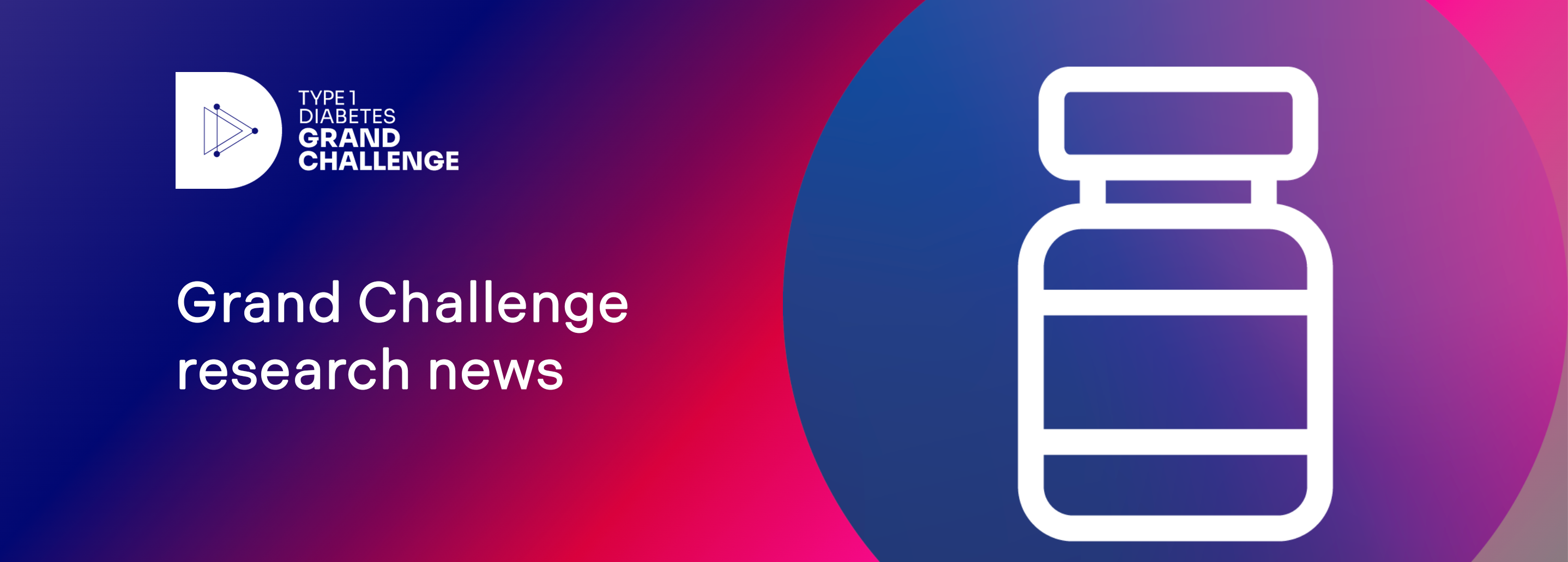The Type 1 Diabetes Grand Challenge has announced funding of more than £2.7 million through the novel insulins challenge to transform type 1 diabetes treatment. This vital funding will accelerate the development of insulins that more closely mimic how a healthy pancreas works, which could improve the lives of people living with type 1 diabetes.
Developing novel insulins
Today’s announcement grants over £2.7 million to six new international research projects focused on developing next-generation insulins, also known as novel insulins. This crucial research aims to design insulins that act faster and more precisely, relieving some of the burden of managing type 1 diabetes and reducing the risk of long-term complications.
People with type 1 diabetes can’t make their own insulin, so they must give themselves synthetic insulin several times each day to survive. But insulin is far from a cure for type 1 diabetes, and new forms of insulin are urgently needed.
Why do we need new insulins?
Blood glucose levels are affected by many factors including food intake, exercise, stress, other hormones, and even the weather. This complexity means that even with the most advanced technology available, many people with type 1 diabetes fluctuate between high and low glucose levels, resulting in short and long-term physical health issues. The relentless struggle to stabilise blood glucose with existing insulins can also be a significant mental burden for people living with type 1 diabetes.
Glucose-responsive ‘smart’ insulins
Four of these newly funded projects involve scientists creating and testing novel insulin formulations that can respond to changing blood glucose levels, known as glucose responsive insulins (GRIs). The concept of glucose responsive insulins is that the drug only becomes active when there is a certain amount of glucose in the blood to prevent hyperglycaemia (high blood glucose) and becomes inactive again when levels drop below a certain point, avoiding hypoglycaemia (low blood glucose).
Ultrafast acting insulin
Researchers running a fifth research project are developing a new ultrafast, short-acting insulin. Even with the fastest insulins that are currently available, there is still a delay between the drug being administered and the point it starts to act on glucose in the blood. This can result in blood glucose rising to unsafe levels before insulin can act to lower it. Faster insulins are also needed to improve the function of insulin pumps and hybrid closed loop technology, a system that relies on the stored insulin responding in real-time to changing blood glucose levels.
Combining insulin and glucagon
The final research project is focused on designing a protein that combines insulin with another hormone, glucagon. Unlike insulin, which helps remove glucose from the blood, glucagon stimulates the liver to release more glucose when levels in the blood run low. Having both hormones included in one formulation could keep blood glucose levels stable by working to prevent high and low blood glucose levels.
Dr Tim Heise, Vice Chair of the Grand Challenge Novel Insulins Scientific Advisory Panel, said:
“Even with the currently available modern insulins, people living with type 1 diabetes have to put lots of effort into managing their diabetes every day to find a good balance between acceptable glycaemic control on the one hand and avoiding hypoglycaemia on the other. The funded six new research projects address major shortcomings in insulin therapy.
Glucose-responsive (so-called ‘smart’) insulins are regarded as the holy grail of insulin as they would come as close to a cure for type 1 diabetes as any drug therapy could. A truly rapid short-acting insulin might make it finally possible to progress from hybrid to fully closed loop systems, allowing a technological ‘cure’ for insulin-treated people with diabetes. Potentially minimising the risk of hypoglycaemia through an insulin-glucagon combination would ease one of the major concerns associated with insulin therapy today. Therefore, these research projects, if successful might do no less than heralding a new era in insulin therapy.”
Professor Simon Heller, Chair of the Scientific Advisory Panel, said:
“This unique funding is transforming the ability of global scientists to join forces to tackle type 1 diabetes. It enables researchers to set up new collaborations and to test innovative ideas which may lead to a step change in finding a cure for type 1 diabetes.”
Rachel Connor, Director of Research Partnerships at JDRF UK, said:
“With this funding programme we have challenged scientists around the world to drive forward new ideas in insulin design to combat the relentless burden of managing type 1 diabetes.
While insulin has been saving lives for over a hundred years now, and previous research has driven important changes for people with type 1, it is still not good enough – managing glucose levels with insulin is really tough, and it’s time for science to find ways to lift that burden.
By imagining a world where insulins can respond to changing glucose levels in real-time, we hope these six projects will help to create that new reality, relieving people with type 1 of the relentless demands that living with this condition places on them today.”
Dr Elizabeth Robertson, Director of Research at Diabetes UK, said:
“This much needed funding boost has the potential to revolutionise type 1 diabetes treatment. By supporting these groundbreaking research projects, we are aiming to develop new insulins that more closely mimic the body’s natural responses to changing blood sugar levels. This could significantly reduce the daily challenges of managing type 1 diabetes, and improve both the physical and mental health of those living with the condition. We are hopeful that this research will lead to life-changing advancements in type 1 diabetes care.”
The exciting development has had widespread media coverage across the BBC, Sky News, and in the national press. Listen to the clip on BBC Radio 4’s Today programme here, at 49 minutes, or watch a clip from BBC News below:
Commenting on the news, Steve and Sally Morgan said:
‘Our aim with the Type 1 Diabetes Grand Challenge is to bring together the best scientists and provide them with the financial support to help accelerate the development of new treatments and, ultimately, a cure for type 1 diabetes. We are excited about the potential of these six new research projects and look forward to following their development as they work towards making life easier for people living with type 1.’
About the Type 1 Diabetes Grand Challenge
More than 400,000 people in the UK have type 1 diabetes and this number is rising year on year, yet medical research remains consistently and woefully underfunded. Insulin, 100 years after its discovery, remains the only available treatment for type 1 diabetes.
Recognising the desperate need to improve the lives of people living with this relentless condition, the Steve Morgan Foundation brought together the two major UK diabetes charities to super-charge the research towards a cure for type 1 diabetes.
Working in partnership with Diabetes UK and JDRF UK, in 2022 the Foundation invested an unprecedented £50 million into the ‘Grand Challenge’, a five-year programme to accelerate medical research into type 1 diabetes.




